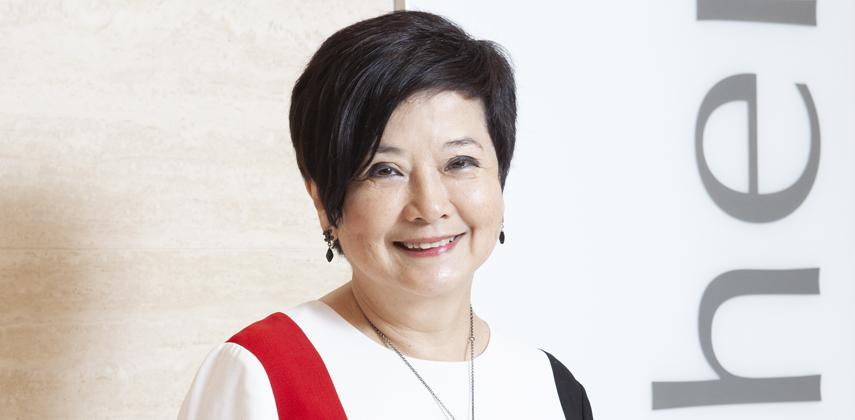Even after more than 40 years working in the legal field, Mabel Lui has lost neither her passion for the law nor her energy for practising it.
One notable feature of her long and successful career as a lawyer has been her engagement with the mainland and developments in its legal system. In 1979, Lui played a part in the first Sino-foreign joint venture in China, as adviser to the foreign investor, and, in 1993, she was on the Hong Kong team of counsel advising on one of the first H share issues by a Chinese corporation.
Now head of the Greater China commercial team for international law firm Withersworldwide, Lui believes that whether you’re in this type of leadership role, or taking the first steps in a legal career, the same fundamental responsibilities and values remain paramount. “As a lawyer, you always have to retain your independence as a professional,” she says. “It doesn’t matter which firm or practice you’re in, at the end of the day, it’s about your personal integrity, professionalism and independence – and I really like this.”
However, this doesn’t mean she’s keen to work on her own. “I’m not someone who has wanted to have their own practice. I want to be part of a larger organisation, where I have support, and where I can brainstorm with other people and develop things together.”
In fact, Withers’ plans to expand its corporate side was a key motivator for her joining the firm last year. “I’ve always been really attracted to the idea of growing and developing a firm.”
The original source of inspiration for Lui’s legal career was a talk given to her, and her St Stephen’s Girls’ College schoolmates, by Professor Dafydd Emrys Evans, the Founding Dean of the University of Hong Kong (HKU) Law Faculty. “He came to talk to us about studying law. He was so eloquent, and he spoke so well, I decided I want to be a lawyer.”
The HKU Law Faculty was established only in 1969, and Lui was part of its third intake of students. In 1975, after graduation, she joined what was then Johnson Stokes & Master, working as a conveyancing lawyer under principal Ronald Wong. When Wong left in 1978 to start his own firm he asked Lui to go with him. Their practice later merged with a larger firm.
Though Lui was born in Hong Kong and has never lived anywhere else, uncertainty about effects of the 1997 return to Chinese sovereignty led her to seek qualification in a number of other jurisdictions, including New York and Singapore. Her concerns, though, proved unfounded. “We barely felt any impact from the handover.”
However, in 1998, her world was turned upside down on both a personal and professional level, when Peter Carey, with whom Lui had established a firm the previous year, was killed in a car accident.
Not wishing to continue her career on her own, she joined Dibb Lupton Alsop (now DLA Piper) and got the chance to help drive that firm’s expansion. “I set up the Shanghai office, the Beijing office, and then expanded the Singapore office. I was also put on the international board, in charge of corporate in Asia.”
One more career move followed before she joined Withers in 2017. In her work with the firm’s Greater China commercial team Lui will be able to put her experience of the mainland’s changing legal system to good use. In 1979, when she advised on the ground-breaking deal, the mainland had no joint-venture or contract law.
“But the sophistication of the system now compared to the old days, is beyond comparison, both in terms of the hardware – meaning the rules and regulations - and the software – the people.” Four decades ago, she says, there were no lawyers, now they are very well trained, very hard working and very good.
There are still challenges, though. “They [the national government and regulators] keep coming up with new rules and regulations and you have to catch up all the time.” Also, she adds, there is sometimes still, ultimately, a discrepancy between the written law and rulings, and this creates uncertainty. “But it is a developing system.”
When it comes to her advice for anyone wishing to pursue a legal career, Lui says the primary requirement is that they have the passion for the profession. “Knowledge and expertise should be a given, so you do have to work really hard when you are a student. As I tell my team members, a lot of things I know now I learned in school, and they’re still very useful.”
Despite the demanding work schedule, she says it’s important that lawyers maintain a decent work life balance. “And they have to develop a good EQ, because interpersonal skills are getting more and more important, not only when dealing with clients, but internally, as well.”
Lui sees no additional hurdles, though, for female graduates joining her profession. She says it sometimes surprises people when she tells them she’s never had any issues around “glass ceilings” or gender discrimination in the course of her career. “In my law class [at HKU] we had more women than men, even in 1971, and the only discrimination I’ve encountered was due to the fact I’m short,” she says with a laugh. “Sometimes when I stood before a judge, he would say, ‘Where are you? Where are you?’”
Of course, this didn’t deter Lui from forging a notable career, and it seems that very little can prevent her adding further chapters to it. “I am very energetic and I can’t imagine ever stopping - one reason is, I’m not good at anything else” she jokes again. “Even now when I get new instructions, and they don’t need to be about anything big, I get very excited.”


